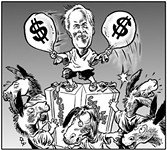Testing, Testing, 1 2 3 ...
The new TAKS numbers say something about Texas schools ... just what is uncertain
By Michael King, Fri., June 4, 2004
Commissioner of Education Shirley Neeley – a self-described education "cheerleader" – was even more effusive, declaring the improvement "awesome," and noting that the individual test passing rates were even higher (ranging from 85% in science to 97% in social studies). "What a way to end the school year!" exclaimed Neeley. "Students and teachers worked hard all year and these results confirm the progress our schools are making."
Yet in the same breath, the governor couldn't help but plug his proposed "performance incentives" that went down in flames along with the rest of his school finance plan in the ill-fated special session. "I remain firmly committed to educational incentives that reward top teachers and focus a new spotlight on academic achievement," Perry said. The obvious question is how had it happened that the scores improved so dramatically over the past year, when the "incentives" were lacking – indeed, in the face of a $500-$1,000 pay cut to many teachers, since most lost at least that much in health care stipends when the Lege reneged on its promise to fully fund the benefits.
Is it just possible that Texas teachers try to do their very best work even when the state isn't dangling a token carrot over their heads? Isn't it just possible that if their primary motivations were financial, they wouldn't have become teachers in the first place?
Who's Accountable?
The point wasn't lost on Texas Federation of Teachers President John Cole, who said the TAKS results confirm "that our teachers are doing a great job," and continued, "Over the past year, legislative committees have spent an inordinate amount of time worrying about ways to fire teachers and devising 'incentive' schemes to motivate teachers. Clearly, teachers are not a problem in this state; rather, they are the ones pushing the envelope on student achievement." Cole called for the governor and the Legislature to build on the test results by increasing funding for education – determined to be at least $400 million short of "adequate" by the Lege's own researchers. Since Perry continues to insist his priority is cutting school property taxes, and the Lege is at best lukewarm about alternative funding sources, the prospects are not encouraging.
Which brings us to the more distressing aspects of the new TAKS results: Despite this year's improvement, even the raw numbers are a considerable distance from where they need to be. Since 72% of juniors passed all tests, almost 30% of all students will need to retake at least one exam before they're eligible to graduate – or nearly a third of students treading water for senior year. As several commentators have pointed out, the numbers for minority students are even more sobering: Even after strong gains, only 58% of African-American students and 61% of Hispanic students are passing all the tests, percentages not surprisingly coinciding almost precisely with those of students defined as "economically disadvantaged" – of whom 58% passed all the tests. (For AISD, the minority numbers were somewhat worse than the statewide averages.)
We like to think of education as the ticket to overcoming broad social inequities, but the Texas test numbers suggest that far too often, "objective" educational results simply serve to confirm and validate racial and class divisions that have been institutionalized for generations.
What History Teaches
And hidden beneath the headline TAKS numbers are even more cloudy statistics. "Passing" the new test this year – admittedly more difficult and comprehensive than the TAAS tests that preceded it – required that fewer than half the questions be answered correctly. For various reasons, thousands of juniors didn't take the tests and don't show up in the averages. Even more discouraging, the state's bloated high school dropout rate means that many more thousands never even make it to the 11th grade to have a shot at accountability testing. Finally, standardized testing remains much more efficient at generating statistics, headlines, and political rhetoric than at educating students – and the improving results in the state's testing regimen have thus far not been reflected in college entrance exams.
That is, the problem with the TAKS numbers – like many complex processes reduced to singular statistics – is not so much what they reveal, but what they disguise, particularly to the extent they may disguise more fundamental educational problems in Texas schools. "Worse than not measuring broader performance," wrote Houston Chronicle columnist Rick Casey last week after cataloging these problems, "there is considerable evidence that reliance on tests such as TAKS is actually making schools worse."
Unfortunately, that's not a conclusion the politicians and the testing mavens are likely to second any time soon – although there was a brief, failed effort in the House to abolish the TAKS last month in favor of required course exams, barely one year into the cycle. It appears we are wedded to "accountability testing" for at least a decade or so, and about the best we can hope for is that teachers and students will figure out how to get the learning done in spite of the tests. That would be much less easy to measure, but far more reason to celebrate. ![]()
Got something to say on the subject? Send a letter to the editor.










